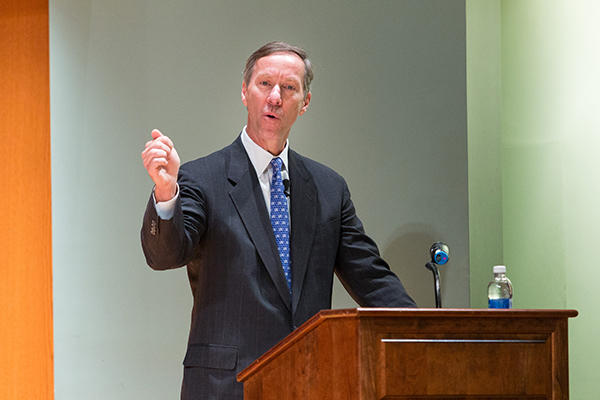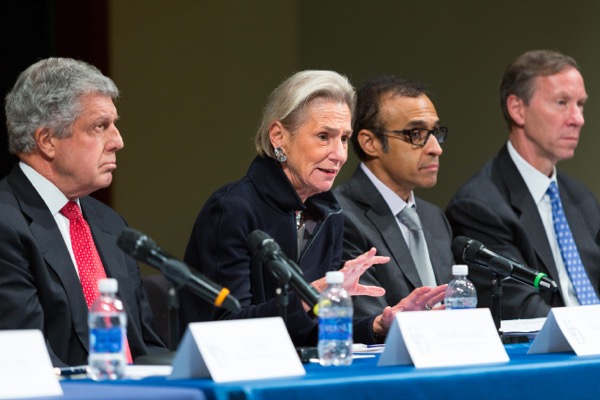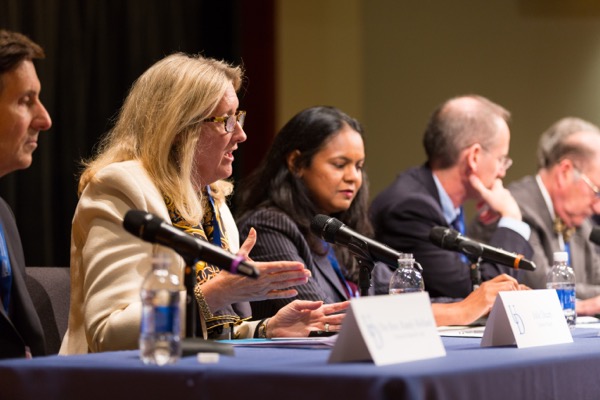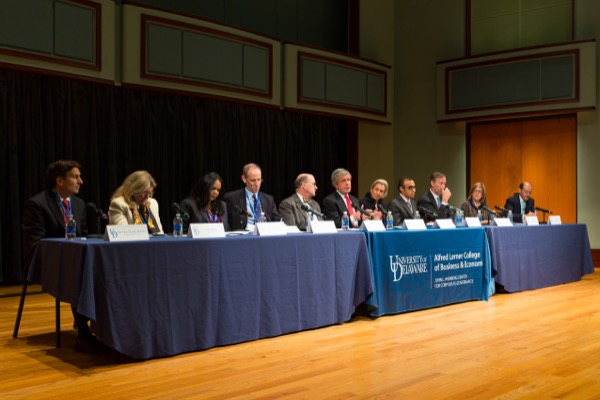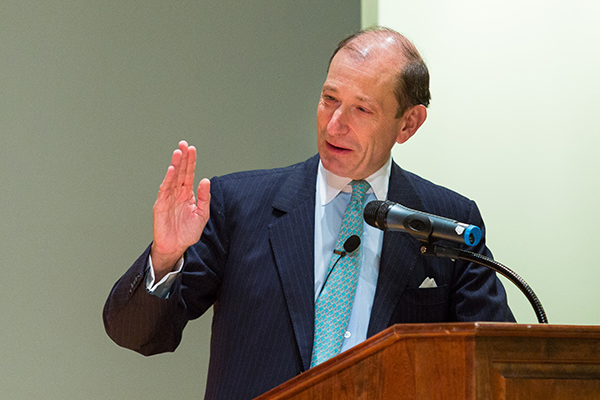Governance address, panel discussion
UD hosts leaders from various fields for discussions on corporate governance issues
12:49 p.m., Nov. 12, 2014--Recently experts from various fields joined Bill McNabb to share their perspectives on corporate governance issues with the University of Delaware community.
McNabb opened the event with an address offering his viewpoint as chairman and CEO of Vanguard, one of the largest investment companies in the world.
Campus Stories
From graduates, faculty
Doctoral hooding
After McNabb’s lecture, authorities from the business, legal and academic worlds joined him on stage for a panel discussion on corporate board composition.
McNabb address
McNabb began his address with a comment on UD’s John L. Weinberg Center for Corporate Governance, which sponsored the day’s event.
“The Weinberg Center is right at the heart of our increased scrutiny on corporate governance,” said McNabb. “It brings academics, corporate boards, investors and regulators together. It’s work that has to continue.”
Maintaining an open dialogue on corporate governance is important, McNabb said, so that corporate boards and investors better understand one another’s expectations and decision-making.
“Corporate governance should not be a mystery,” he said. “Over the last decade, the mystery has begun to dissipate. We are beginning to see greater clarity. But I still think there are opportunities for that mystery to disappear even more completely.”
During his time with Vanguard, a company that manages over $3 trillion in assets for investors in the United States and abroad, McNabb said that governance has become even more vitally important.
“If we can influence governance so that companies are managed better, then they’re going to create more wealth for the investors,” he said. “That’s why governance is key.”
A strong company, McNabb said, focuses on accountability. This includes management’s accountability to the board as well as the board’s accountability to shareholders. Also important is what McNabb calls “engagement,” or active communication between investors and companies.
McNabb shared positive examples from Vanguard’s experience working with hundreds of companies, as the function of corporate boards has evolved over time. It is important that boards become even more active in the future, he said.
McNabb suggested the formation of shareholder relations committees on corporate boards.
“A more proactive committee with real structure and guidelines will take corporate governance to an entirely different level,” he said. “This is going to be part of the dialogue as we continue to evolve to make our markets the best markets in the world.”
Panel discussion
After taking questions from audience members, McNabb was joined on stage by the other individuals participating in the “Board Composition” panel. In addition to McNabb, the panel was comprised of leaders in a range of fields, including:
- Julie H. Daum, partner and co-practice leader of the North American Board and CEO practice, Spencer Stuart; member of the Spencer Stuart board of directors.
- Michael Garland, assistant comptroller for environmental, social and governance, New York City Office of the Comptroller.
- Randy J. Holland, justice, Delaware Supreme Court.
- Rakhi Kumar, head of corporate governance, State Street Global Advisors.
- Rochelle B. (Shelly) Lazarus, chairman emeritus and former CEO, Oglivy and Mather Worldwide; independent director of General Electric and chair, Governance and Public Affairs Committee; director of Blackstone Group, L.P.; director of Merck and Co. Inc.
- Simon M. Lorne, vice chairman and chief legal officer, Millennium Management LLC.
- William E. McCracken, president, Executive Consulting Group LLC; former CEO, CA Technologies.
- Ann C. Mulé, associate director, Weinberg Center.
- Thomas E. Sandell, founder, chairman and CEO, Sandell Asset Management.
Charles M. Elson, Edgar S. Woolard, Jr. Chair in Corporate Governance, professor of finance and director of the Weinberg Center, served as moderator of the discussion.
“We’re at the beginning of a huge change in board composition,” said Elson. “It’s been an extraordinary movement where we’ve seen a push for independent directors with industry experience.”
“The board is there to monitor management,” Elson continued. “To be a good monitor, you have to have expertise in many areas.”
Board members were in agreement about the positivity of this shift toward board members with industry-specific experience.
“You need to have one or more people on the board with industry knowledge in order to really understand company strategy and risk,” said Mulé.
Lazarus agreed, saying, “For the board to be able to turn to an expert and have a real conversation about what they think is of enormous value.”
Drawing on her experiences working with General Electric, Lazarus said that when considering board composition she keeps in mind the idea of “cognitive diversity.” This means ensuring that boards hold members with a wide variety of backgrounds and thinking styles.
The panel also discussed importance of diversity in other areas, like gender and race.
“There has been a resurgence in interest in women in the board room,” Daum said, citing that in the past year the S&P 500’s percentage of women selected increased from 18 percent to 30 percent.
“Diversity is crucially important to the way that a board functions,” Lazarus added. She said that, when pressured to create diversity, boards often find excellent talent in candidates they would not have considered otherwise.
Companies use tactics like term limits and mandatory director evaluation in hopes of creating ideal boards. Policies like these ensure board refreshment, although opinions are mixed on which tools are best to employ.
“There are issues of dead weight,” said Garland. “Who is adding value to the boardroom? Directors don’t want to have that conversation with other directors. They don’t want to tell them to go. So they lean on these blunt instruments that may not be in the best interests of the corporation or the shareholders.”
“Someone from the audience asked the question earlier, ‘Wouldn’t I be better, instead of putting in an artificial age or term limit, if we just looked around the room and asked who’s doing a good job and whose skill set is no longer relevant to this business?’” Daum said. “In an ideal world that would be great, but in our experience that’s difficult and doesn’t happen very often.”
McCracken said that companies should expect boards to manage themselves just as efficiently as the company manages itself, noting changes he has seen during his 15 years of experience in corporate boardrooms. With the resources available online today, he said, board members should now be expected to proactively research their industry, competitors and technological and environmental shifts.
“Board members’ requirements for me go far beyond what was expected half a decade ago,” he said.
When companies do choose a knowledgeable and diverse board, Sandell said, it is possible for all interests to be properly represented within the company.
“Everybody can be a winner,” Sandell said. “It’s sad when CEOs feel that there has to be a loser for somebody else to be a winner. But if everybody has the same goal, to provide value for shareholders, you will leave a better company behind you.”
Article by Sunny Rosen
Photos by Kevin Quinlan






